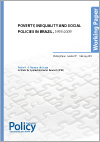
Poverty, Inequality and Social Policies in Brazil, 1995-2009
Autor:
Pedro H. G. Ferreira de Souza
Resumo:Since the mid-1990s, Brazil has undergone extensive reforms that have finally reversed the dismaying economic performance of the 1980s. In particular, poverty and inequality indicators have improved dramatically, especially since the late-2000s. This paper provides an overview of such recent trends and discusses the role played by four major government interventions: public education, the minimum wage law, Social Security pensions and Social Assistance transfers. Additionally, available data sets and methods for policy evaluation are also discussed. (…)
Palavras-chave:Poverty, Inequality, Social Policies, Brazil, 1995-2009
Data de publicação:
Tipo/Issue:Working Paper/87
ISSN:1812-108X
Esta publicação também pode ser encontrada em um formato condensado e/ou expandido: